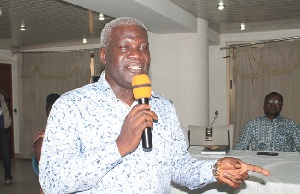 General Secretary of ICU, Solomon Kotei
General Secretary of ICU, Solomon Kotei
With barely eight months to the deadline for the recapitalization of banks to a minimum of GH¢400 million, Ghana’s banking industry is rife with apprehension and debate as indigenous banks join forces and make a case for a possible extension of the deadline.
Banking experts, economic analysts and some business groups are hotly debating issues bordering on consolidation of banks in the country and the survival of local banks amidst stiff competition from foreign-owned banks.
While the debate has been to have more local banks in the system in order not to give the control of the financial system to foreign banks, others believe it is not about the number of indigenous banks but their size and ability to control about 50 percent of both deposits and assets to support businesses in the economy.
Analysts indicate that indigenous banks need about GH¢4billion to meet the Bank of Ghana’s GH¢400 million minimum capital requirement by December 31, 2018, a very tough hurdle to run.
ICU kicks against wholesale implementation
The Industrial and Commercial Workers Union (ICU) is unhappy the BoG’s minimum capital requirement of GH¢400million must be met even by rural banks.
ICU’s General Secretary, Mr Solomon Kotei told this paper “the development could cripple the rural banks and the niche they serve.”
He called for some segmentation in the implementation of the capitalisation policy and commended the regulator for rising to the occasion and putting measures in place to forestall the collapse of some indigenous banks.
“Had it not been for its supervision, we would have had bigger shocks for the economy.” Mr Kotei submitted.
PEF canvasses for more local banks against foreign ones
President of the Private Enterprises Federation (PEF), Nana Osei Bonsu, wants to see more local banks than foreign banks at the end of the recapitalization programme.
According to him, once the consolidation is done, there should be 10 local banks as against five foreign ones in the country.
Presently, there are 17 indigenous and 17 foreign banks, and it appears about 90 percent of the foreign banks will meet the Central Bank’s recapitalization deadline. But Nana Osei Bonsu believes the foreign banks should reduce their ownership for Ghanaians to become part and majority owners.
“Once the consolidation takes place, we should have 10 local banks and five foreign banks in the banking system. Whatever methodology you use at the end of the day you should have 10 locals and five foreign banks. The Central Bank has authority to reduce the number of banks in the country, particularly foreign banks. Other countries have been through this so it is possible the Central Bank could find avenues to reduce the foreign banks to that level we are talking about,” he explained.
He added that “You can also ask a foreign bank to list on the Ghana Stock Exchange with 51 percent shares floated to Ghanaian investors and automatically you get a local bank. At the end of the day what we are looking at is to get 10 local banks and five foreign banks.”
The PEF CEO who is also a retired banker urged the Central Bank to help local banks to obtain cheap deposits in order to reduce their cost of capital and ultimately cost of operations. “I think the Central Bank has a key role to play by working with the local banks; those that are not efficient make them efficient those that are struggling, bring them to consolidate, it’s not a point that every bank must survive.”
Banking Consultant, Emmanuel Akrong for his part also said the Bank of Ghana should make sure that the current market share of the local banks does not fall below the 40 percent current mark.
Indigenous banks control out about 40 percent of both deposits and assets in the Ghanaian banking industry. Mr Akrong noted that “Behind the scene, the BoG should be looking at making sure that the current market share of the domestic banks doesn’t fall below what we have presently because we have 60 percent of our banking sector-whether deposit or assets owned by foreign banks.”
Some local banks this week met with President Nana Akufo-Addo to plead with him to impress on the Bank of Ghana to extend the deadline of the recapitalization programme for indigenous banks.
But Business Finder sources at the Bank of Ghana indicate that the regulator is resolute in keeping the minimum capital requirement at playing field to all the banks.
Its argument is that the foreign banks have largely complied with banking regulations.
Based on their shareholders’ funds, about 12 banks are likely to meet the minimum capital requirement of GH¢400 million by the Bank of Ghana far ahead of the deadline since they have more than enough capital in their balance sheet.